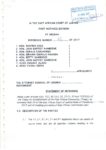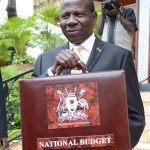Kenyan politician Ralia Amoro Odinga has gone to court over the agreement signed by the government of Kenya and other three oil marketing companies on importation of oil products.
On March 10, 2023 the government of Kenya through the Ministry of Energy and Petroleum signed three master Framework Agreements for the importation of refined petroleum for sale in Kenya and transits market with Aramco Trading Fujairah FZE, Emirates National Oil Company (Singapore) Private Limited and Abu Dhabi National Oil Company Limited.
Odinga, basing on his letter dated, on November 20, 2023 referred to the agreements as scandalous oil importation saga and asked the Oil marketing companies to raise the mandate of their offices and discharge constitutional and legal duties in enforcing accountability of this matter.
However, none of the companies responded to his call which he said that their silence may be an indication of their belief that the call to duty is mistaken, a possibility and instructed the lawyers to correct it by laying out to the companies the facts.
Through his lawyers Odinga says that The Ethics and Anti-corruption Commission is charged by Article 79 of the constitution of Kenya to ensure compliance with and enforcement of the provisions of chapter six of the constitution on Leadership and Integrity.
“Section 1 of the Ethics and Anti-corruption Commission Act requires the commission to investigate and recommend to the Director of Public Prosecutions any acts of corruption, bribery or economic violation of codes of ethics or other matters prescribed under the constitution and the law,” Lawyers stated.
The letter states that contemporaneously, the government of Kenya signed an operations agreement in relation to the importation of refined petroleum products with three oil marketing companies where the first three agreements were executed for the government of Kenya by the Cabinet Secretaries of the National Treasury and Economic Planning and the Ministry of Energy and Petroleum and witnessed by the Principal Secretary in the State Department for Petroleum. The second agreement was executed for the government of Kenya by the Cabinet Secretary of the Ministry of Energy and Petroleum and witnessed by unidentified principal secretary.
“Despite the attempt to fashion the oil importation deal as a sovereign arrangement between the government of Kenya and the government of Saudi Arabia and the United Arab Emirates, this is a commercial contractual arrangement with private companies. At least one of these companies is not incorporated in the country which is purported to represent as a sovereign entity. Indeed, none of them even purport to represent the governments claimed as popularly claimed,” added in the letter.
Lawyers further stated that the phrase “Government to Government” was not used anywhere in the copies of the Master Framework agreements shown to them nor any reference to any understanding between the government of Kenya and any sovereign government.
But surprisingly, it is the Operational agreement that started using the phrase “Government to Government” the purpose for as said below was to undermine Kenya’s laws on procurement of goods and services.
The lawyers clarified that the sovereign agreements do not emanate from tenders although it is claimed that these are sovereign contracts.
It is also claimed that there was procurement of the international suppliers which is contradicting and illogical too that the government of Kenya would have tendered to procure a representative of a foreign sovereign government.
“Although the operational agreement uses the phrase “Government to Government Framework” this phrase is not used by the Master Framework Agreement on which the operational agreement is based,” lawyers noted.
Further, a reading of the operational agreement makes it clear that the nominated oil marketing companies are agents of the people of Kenya and not agents of international suppliers.
It is again contradictory that a foreign supplier gets to nominate the buyer of its products and also nominates the agent for the people of Kenya under the Petroleum Act.
“The operational agreement undermines the national interests and embarrasses the people of Kenya, clarifying that although the operational agreement is between Government to Government, three locally incorporated oil marketing companies licensed by the government and the bank where the government is a major stakeholder, the agreement is to be, “governed by, interpreted and construed in accordance with the law in England.”
Further, in case of arbitration following the dispute, the arbitration shall be conducted under the Rules of arbitration of the London Court of International Arbitration.
“The arbitration clause including its validity and scope shall be governed by English laws. These are just some of the glaring issues that call upon you to commence investigations into this saga. It is a very grave matter when private commercial arrangements are established to oust the processes set up by law, the way this system named and styled G-to-G has done to the Open Tender System established by the Petroleum Act.”
Uganda
Earlier High Court in Kenya sitting at Machakos issued a conservatory order stopping the issuance of an Oil Importation Certificate to the Uganda National Oil Company, UNOC. UNOC intends to hire Vitol energies to transport its fuel from Tanzania into Uganda.
The order dated November 7, 2023 and issued by The Deputy Registrar of the Machakos court followed a petition by three parties including Royani Energy Limited, John Kinuthia Mwangi and Acacia Ridge Construction as interested parties, and ordered the Director General of Kenya Energy and Petroleum Authority not to issue the license to UNOC.
The matter registered No. E014 of 2023 and certified urgent by the Human Right Division of the court, quotes 17 Articles of the constitution of Kenya, 4 Rules of the CoK in respect to the protection of Rights and Fundamental Freedoms, Practice and Procedures 2013, and their violation of Fundamental Rights and Freedoms under Articles 27, 37, 40, 46 and 153. Other respondents in the matter are the Kenya Cabinet Secretary for Energy and the Attorney General of Kenya.







